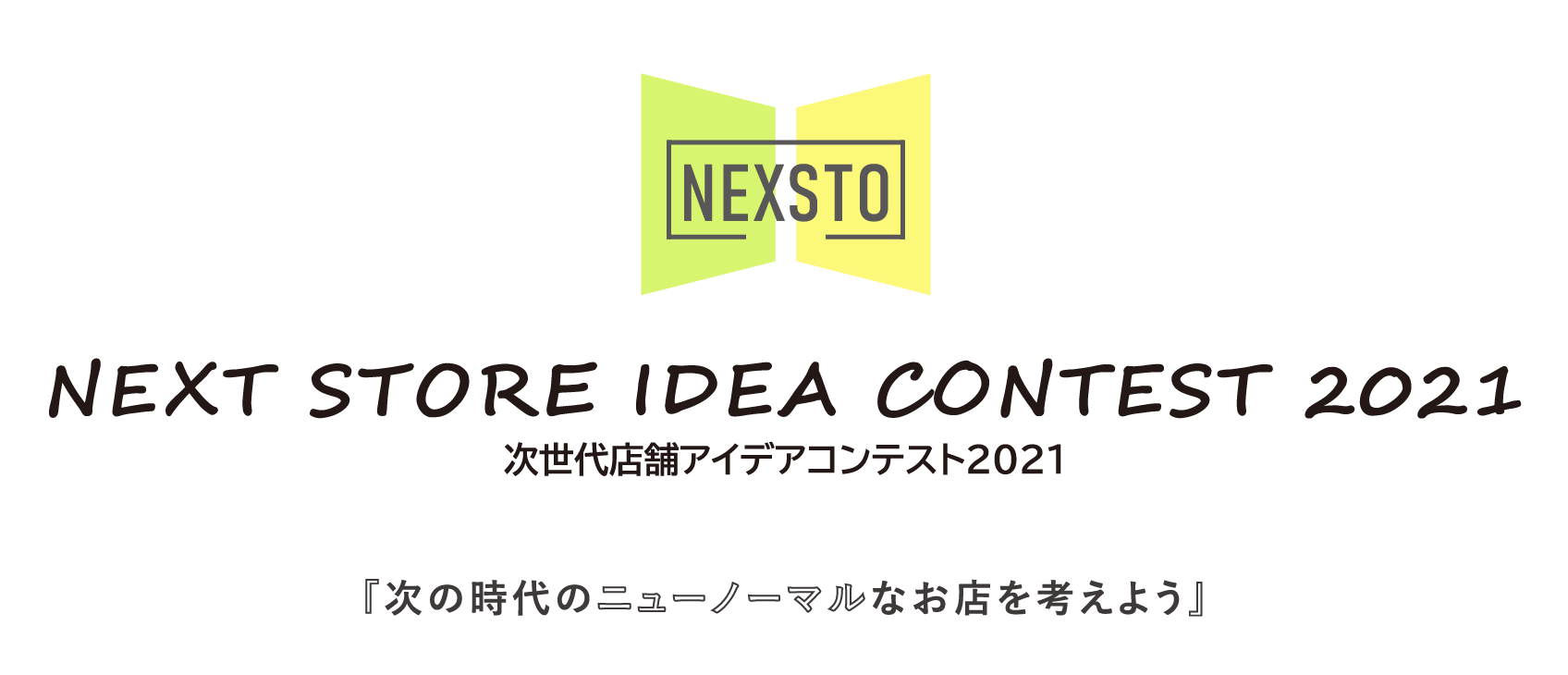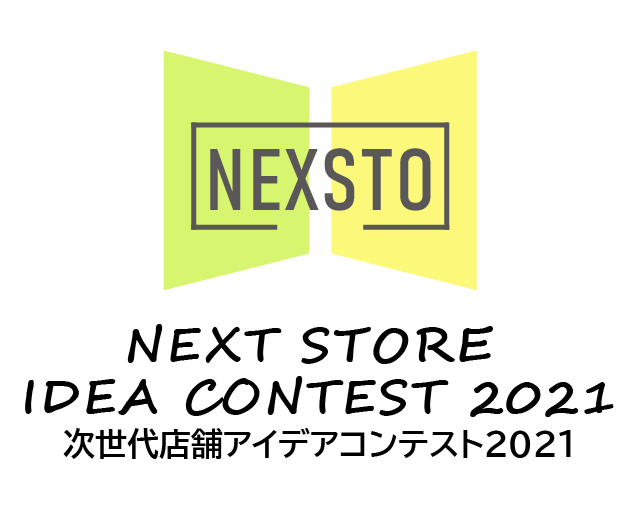We invited free ideas from a wide range of industries and business formats, such as ideas for stores that incorporate digital technology to provide new experiences, or new, comfortable stores with a sustainability theme. In this article, we spoke with Matsuoka Hideki, winner of the Grand Prize in the first commemorative "Next Generation Store Idea Contest," and Fujiwara Ryutaro, winner of the Special Jury Award, about how they decided to apply to the contest, the thoughts behind their works, and their thoughts looking back on the contest.
Interview movie
Looking back on "NEXSTO - Next Generation Store Idea Contest 2021"
Please tell us what made you apply for "NEXSTO - Next Generation Store Idea Contest 2021". |
Hideki Matsuoka (hereinafter, Matsuoka): Currently, I am mainly focusing on residential space design, but I used to work in store design. I happened to find out about NEXSTO this time, and with restaurants currently struggling due to the COVID-19 pandemic, I applied in the hope of proposing some interesting ideas to help break through this situation.
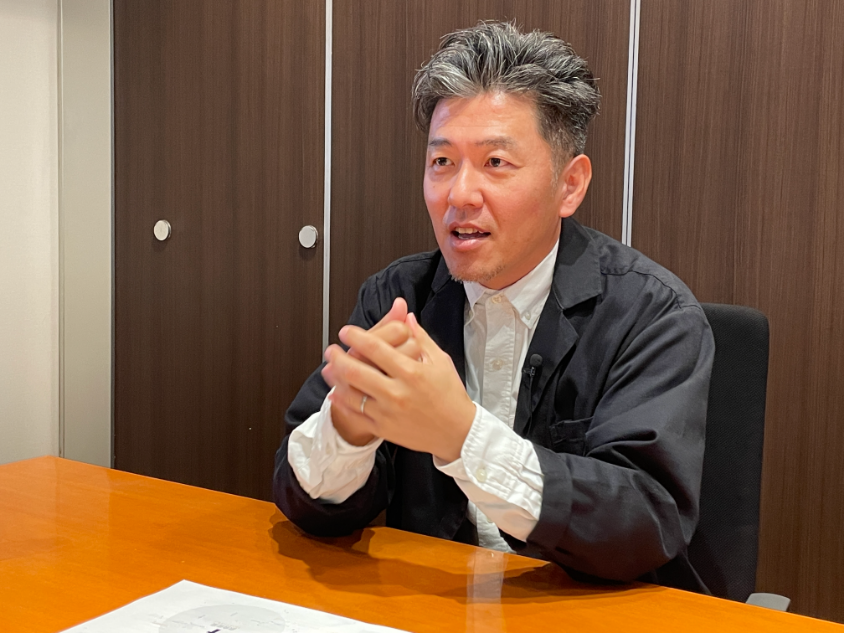
Hideki Matsuoka Interior Designer/Director
Born in Yamaguchi Prefecture in 1978. Former store designer. Learned commercial design through store design, product development, and branding. Works at a major interior design and construction company, designing stores for commercial facilities nationwide. Currently active in Fukuoka City, focusing on residential space design. With "Love & Design" in mind, he wants to discover user experiences that connect to "space." His main themes are "design," "education," and "business." He is passionate about combining these three themes to create new value and proposals. Father of three children. He writes serial articles about spatial design, including cities, architecture, and stores, for "Fukuoka's economic media NetIB-News."
https://www.data-max.co.jp/
Ryutaro Fujiwara (hereafter, Fujiwara): I also applied after seeing "Toryumon*1". I hadn't seen many contests that solicited ideas for store designs, so I was interested. I was attracted to the fact that anyone could participate, whether they were a student, a working adult, or a designer with no track record.
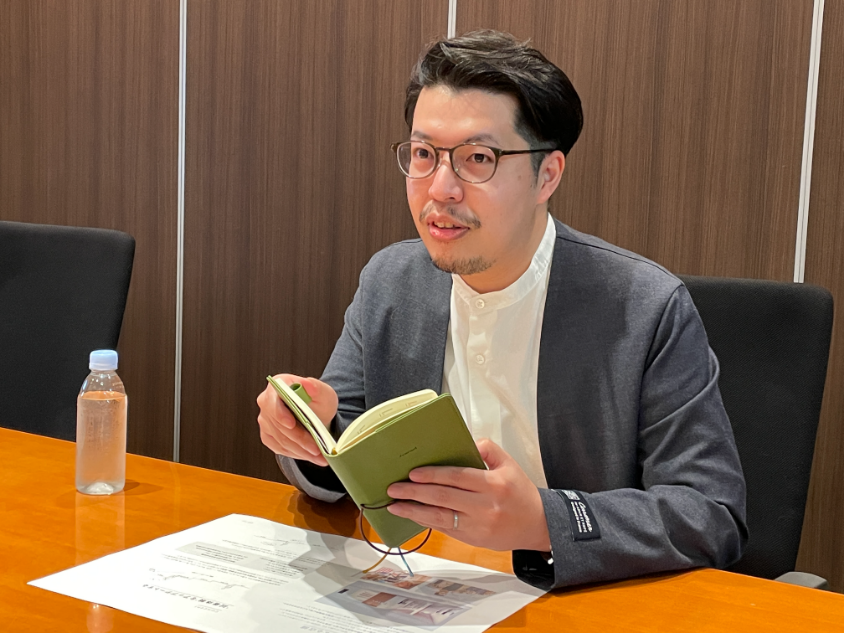
Ryutaro Fujiwara, Representative of TRYANGLE DESIGN
Born in Miyazaki Prefecture in 1986. Graduated from the Department of Industrial, Craft and Craft Design at Musashino Art University. After gaining experience at store design companies in Tokyo and Fukuoka, he went independent in Fukuoka in 2018. He is particular about aesthetic beauty, and his designs are strongly conscious of the "relationship" between the client and the end user. His motto is to always ask himself "why?" and to face his clients politely and honestly, so as not to repeat conventional designs. In the future, he would like to carry out store branding to create stores that will be loved for a long time.
What do you think about the 2021 theme, "Let's think about the new normal stores of the next era"? |
Matsuoka: I like keywords like "new" and "new," so I honestly thought it would be interesting. I think "new normal" means "new standard," and I intuitively felt that something like that will be needed in the future, especially in the midst of the COVID-19 pandemic. The theme is so broad that I struggled to figure out how to interpret it.
Fujiwara: It was a time when the term "new normal" was often seen in various situations. There are many product-related contests based on such abstract keywords, but my first impression was how they would be shaped in stores. I was also interested in what kind of proposals the other applicants would make. Also, the judges were very diverse. Their comments were posted on the website, so I read them carefully, and I created my proposal while keeping in mind the business types and efforts of each company.
About the Award-winning Works
Please give us an overview of your winning work and the message you wanted to convey. |
Matsuoka: The "Himitsu Restaurant" is an idea to create a new dining format by bringing together four industries - architecture, real estate, mobility, and food and beverage - and link it to modern lifestyles based on the concept of "eating out at home". We came up with a system to inherit the food stall culture by gathering food trucks at the dock and developing a new business model that offers a variety of food content.
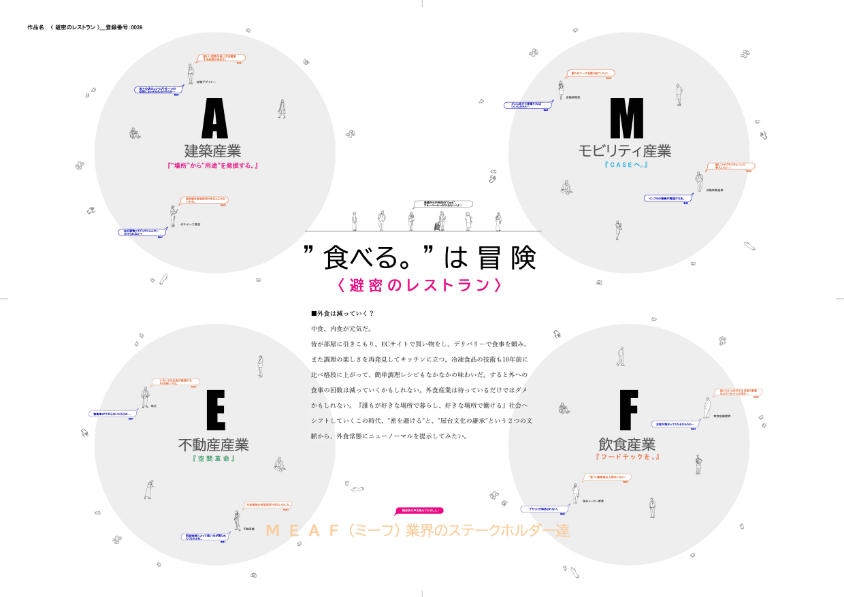
Grand Prize Winner "Himitsu Restaurant" / Hideki Matsuoka
Fujiwara: The concept of the "#TryItOnStore" is to "update the try-on experience." With the spread of e-commerce sites, stores have changed from being just a place to buy to being one of many options, but stores have gained a relative advantage in that customers can actually pick up and try on the products. While taking advantage of these strengths of brick-and-mortar stores, we proposed measures to turn trying on clothes into a more enjoyable experience, such as installing camera-in mirrors, developing a dedicated app, and optimizing store layouts.
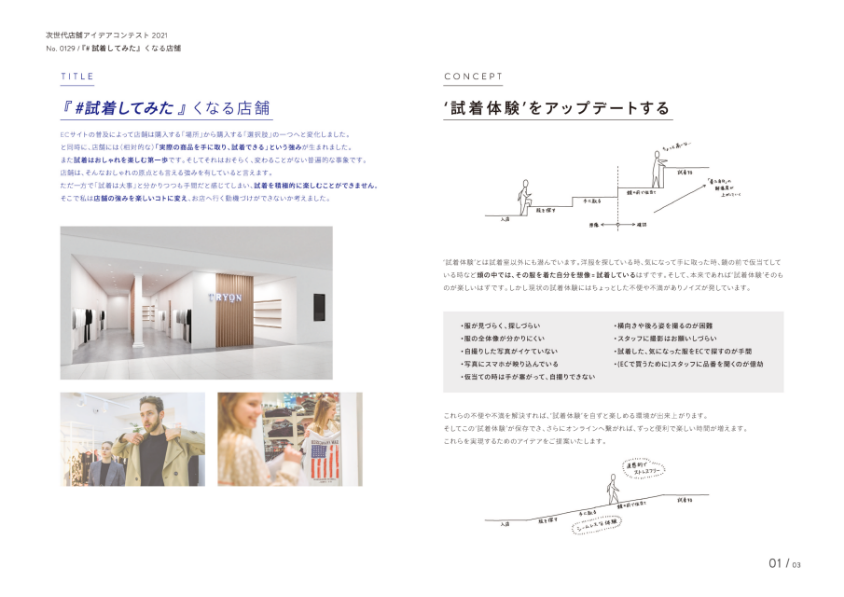
Special Jury Award: "A store that makes you want to try things on" / Ryutaro Fujiwara
What was the idea or perspective that led to the winning entry? |
Matsuoka: During the COVID-19 pandemic, restaurants were unable to operate as usual, and many restaurants around me were struggling, so I thought it would be nice to propose a new way of using restaurants. So I put together my ideas by going against the current trend. For example, a fixed store could be made to move. Since architecture is based on the premise that it does not move, I thought that in order to make it move, I should attach wheels, and then the mobility industry would come in. I thought that the idea of going against the current trend was the breakthrough to break through preconceived notions, so I built it from that perspective. In addition, the concept of "eating out" came from the fact that I felt that there were many forms of eating and drinking that did not fit into the three categories of "eating at home," "eating out," and "eating out." It is a form that is not a traditional "eating out" form, such as ghost restaurants and delivery. I put my desire to connect these with restaurants that have real spaces into my work.
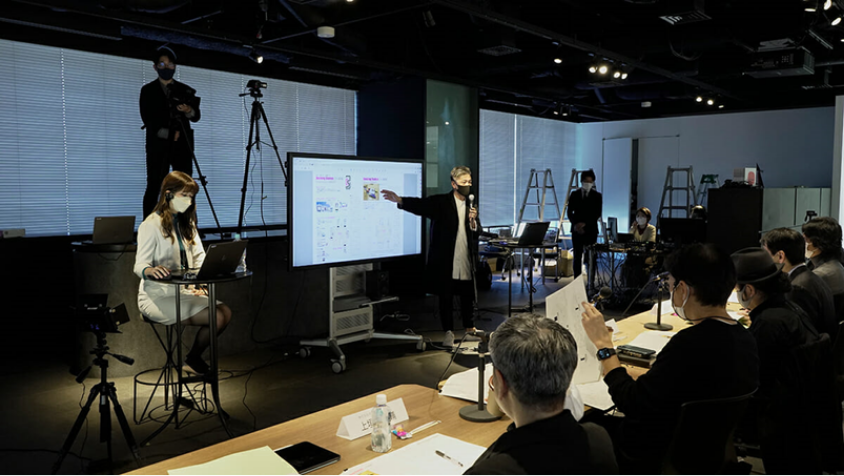
The final selection session
Fujiwara: We dug into the theme of the word "new normal". First, we assumed that the new lifestyle was "purchasing habits at apparel stores", which led us to the question, "Why do I want clothes?" In my case, my underlying desire was "I want to be fashionable". From there, I realized that apparel stores are not just places to buy clothes, but places to buy fashion. But trying on clothes in a store is a big hurdle for me personally. In my case, I was reluctant to go shopping for clothes until I got married, but now I go with my wife and have her look at them. I'm happy when she says "it looks good on you" even if it's just flattery. Because I had such a fun experience, I thought it would be nice to create a store where people can enjoy trying on clothes and fashion even by themselves, and that was the starting point.
Please tell us your impressions of participating in "NEXSTO - Next Generation Store Idea Contest 2021". |
Matsuoka: It was fun. The application period, which was the production period, was up to three months, and it was quite difficult during that time. There were some ideas that could only be proposed now during the COVID-19 pandemic, and if the pandemic ends this year, I think we'll see some different ideas.
Fujiwara: I had a lot of fun, and it was a turning point for me personally. I did a lot of research and preparation, and thought through what the new normal would mean for me. There were difficult moments when I was stuck in a thought loop of "What's the point of opening a store?"
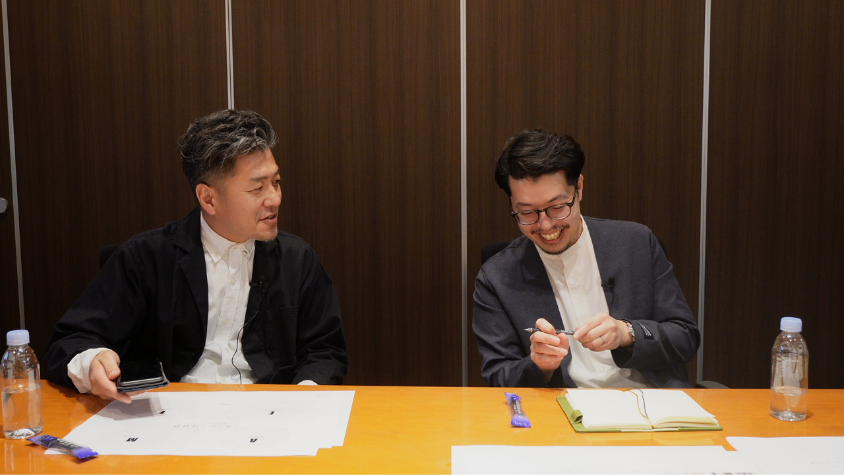
Towards "NEXSTO - Next Generation Store Idea Contest 2022"
Do you have any advice for people who are thinking about taking on the challenge of "NEXSTO - Next Generation Store Idea Contest 2022"? |
Matsuoka: I think that applicants will look at the winning works in 2021 and first consider whether they should move forward in the same direction as the winners or whether they should change course. Last year's competition was held when the COVID-19 pandemic was at its worst. On the other hand, this year, we have taken root and signs of recovery are beginning to appear. I would like each applicant to think carefully about what direction they should take in this situation.
Fujiwara: I'm interested in the sensibilities of Gen Z. How will this generation, known as digital natives, express the next generation of brick-and-mortar stores? This year, a new student award will be established, so I'd like to see not only essential proposals, but also proposals that utilize new, never-before-seen sensibilities, such as "this kind of store would be cool."
What role do you think digital technology will play in shaping the next generation of stores? |
Matsuoka: I think that people who visit stores still want to have a certain degree of analog. You can shop at home using apps and other digital technologies, and if you go to a brick-and-mortar store, you want to have the experience of interacting with someone in a real space. Maybe it's different for Gen Z, though.
Fujiwara: I also think that services that rely on digital technology will be less accepted in the future, especially among the younger generation. It's all about what's convenient for the user. Whether it's analog or digital technology, consumers will choose what they like and what's convenient, and I think this tendency is especially strong among Generation Z.
Please tell us about your future aspirations and challenges. |
Matsuoka: I get the impression that sustainability and the SDGs are on the rise, so I want to do what I can in that context. In Japan, there is a strong belief in new construction, so I would like to combine the assets of existing spaces to propose new industries and services.
Fujiwara: I've been interested in the metaverse lately. I'll continue with store design, but I'd also like to try creating a store in a virtual space. I think that if the metaverse becomes widespread, it will give rise to communication services that are different from existing SNS.
Interview and text: Fumika Nakajima (Tanseisha) Photography: Keita Otsuka (Tanseisha)
【Related Articles】
Design information site "JDN"
Creating experience value for a new era: "NEXSTO - Next Generation Store Idea Contest 2021" Project Report
https://www.japandesign.ne.jp/report/tanseisha-nexsto/
